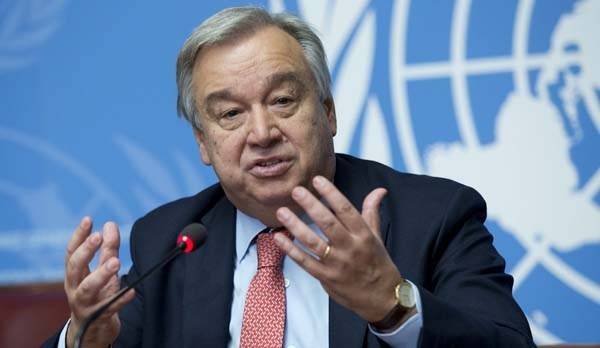United Nations Secretary-General Antonio Guterres said on Tuesday it was “not the time” to reduce resources for the World Health Organization (WHO), a Geneva-based UN specialized agency, after President Donald Trump halted U.S. funding over the body’s handling of the coronavirus pandemic.
In a statement, Guterres said it was “not the time to reduce the resources for the operations of the World Health Organization or any other humanitarian organization in the fight against the virus.”
“Now is the time for unity and for the international community to work together in solidarity to stop this virus and its shattering consequences,” the U.N. secretary-general added.
As of Tuesday, there are more than 1.8 million confirmed cases, according to WHO figures, with more than 117,000 confirmed deaths, and 213 countries, areas or territories with cases of the new coronavirus.
President Trump said earlier Tuesday evening that the U.S. would halt funding to the WHO and conduct a 60- to 90-day review “to assess the World Health Organization’s role in severely mismanaging and covering up the spread of the coronavirus.”
The president also criticized the WHO for its praise of China’s handling of the coronavirus as it emerged, although Trump himself also spoke positively of China at the time.
The secretary-general said that WHO, with thousands of its staff aiding and assisting operations across the world to limit the transmission of the coronavirus, “is on the front lines, supporting Member States and their societies, especially the most vulnerable among them, with guidance, training, equipment and concrete life-saving services”.
“It is my belief that the World Health Organization must be supported, as it is absolutely critical to the world’s efforts to win the war against COVID-19.”
Reiterating the argument which he made last week, the UN chief noted that given the unprecedented nature of COVID-19 and the subsequent global response that was needed to defeat it, “it is possible that the same facts have had different readings by different entities.
Once we have finally turned the page on this epidemic, there must be a time to look back fully to understand how such a disease emerged and spread its devastation so quickly across the globe, and how all those involved reacted to the crisis.”
The lessons learned will be essential to effectively address similar challenges, as they may arise in the future”, Guterres added. “But now is not that time.”
Guterres made it clear that unity must prevail, so that the international community can work together, “in solidarity to stop this virus and its shattering consequences.”
Ever since the disease emerged in Wuhan, China, and the first case of a pneumonia “of unknown cause” was reported to WHO on 31 December last year, the agency has been working round-the-clock to analyze data, provide advice, coordinate with partners, and help countries prepare.
The outbreak was declared a Public Heath Emergency of International Concern, a month late Meanwhile, numerous other people and institutions have warned Trump against the move to cut WHO funding, with the American Medical Association (AMA) calling it a “dangerous step in the wrong direction.”
“Fighting a global pandemic requires international cooperation and reliance on science and data. Cutting funding to the WHO – rather than focusing on solutions – is a dangerous move at a precarious moment for the world,” the AMA said in a statement.
Numerous Democratic lawmakers have also criticized the announcement.
“The White House knows that it grossly mishandled this crisis from the beginning, ignoring multiple warnings and squandering valuable time, dismissing medical science, comparing COVID-19 to the common cold, and saying ‘everything will be fine,'” Senator Patrick Leahy, the senior Democrat on the Senate Appropriations Committee, said Tuesday.
“Not wanting to take responsibility as the deaths continue to mount, he blames others.”
“He wants this to be about other countries so he doesn’t have to explain why South Korea and the USA got hit with their first cases at the same time, but South Korea prevented mass deaths,” Senator Brian Schatz added.






